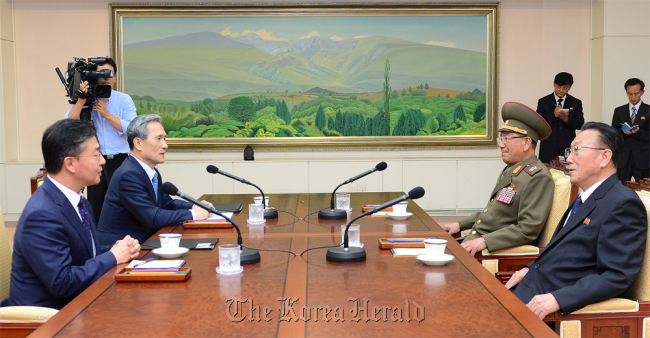As the high-level inter-Korean dialogue dragged on, hopes and doubts were flying around the seemingly incongruous duos from each side driving the rare gathering: rigid former and incumbent military commanders paired with preachers for a cross-border thaw.
From the North, Hwang Pyong-so, vice chairman of the powerful National Defense Commission and director of the General Political Bureau of the (North) Korean People’s Army, joined hands with Kim Yang-gon, director of the North’s United Front Department and a secretary of the ruling Workers’ Party’s Central Committee, to steer the talks.
Across the negotiating table were Kim Kwan-jin, chief of Cheong Wa Dae’s National Security Office, and Unification Minister Hong Yong-pyo.
 |
Delegates of the two Koreas sit facing each other at their talks in Panmunjeom on Saturday. From left are: South Korea’s Unification Minister Hong Yong-pyo, South Korea’s National Security Office Chief Kim Kwan-jin, North Korea’s National Defense Commission Vice Chairman Hwang Pyong-so and North’s United Front Department Director Kim Yang-gon. (Unification Ministry) |
The two-plus-two meeting came after Seoul requested Hwang instead of Kim Yang-gon as the counterpart of Kim Kwan-jin. Pyongyang then demanded Hong, a former professor in North Korean studies, to accompany the former defense minister.
While 73-year-old Kim Yang-gon is known for orchestrating cross-border affairs, Hwang, as a top military leader and one of the closest aides to leader Kim Jong-un, was seen holding the key to a possible breakthrough.
The 67-year-old Hwang’s meteoritic rise came to light in April 2014 when the North’s state media announced his promotion to four-star general and the rarefied, coveted rank of vice marshal.
The decision made by the party’s Central Military Commission spurned rampant speculation over the standing of Choe Ryong-hae, then chief of the politburo who was apparently flexing political muscle especially in the aftermath of the December 2013 execution of Jang Song-thaek, the young ruler’s once-formidable uncle and former NDC vice chairman.
Having since taken over the positions of both Choe and Jang, Hwang frequently escorts Kim Jong-un on his public outings, appearing at a close distance.
Hwang is believed to have won the trust of Kim’s late mother Ko Yong-hui in the run-up to his power succession, following the death of longtime dictator Kim Jong-il in December 2011, and had taken university classes together with Kim Kyong-hui, the leader’s aunt.
He became a three-star general in April 2011 and the first vice director of the party’s organization guidance department in March 2014.
Last October he made a surprise trip to the South alongside Choe Ryong-hae and Kim Yang-gon primarily to attend the closing ceremony of the Asian Games in Incheon. Hwang and Kim Kwan-jin held their first talks during the one-day visit, which was also attended by Hong, who was then a presidential unification secretary.
Kim Yang-gon, meanwhile, remains one of the few figures from the late leader’s era who has weathered a string of bloody purges and personnel shakeups under Kim Jong-un.
He rose to fame as a prime engineer in key inter-Korean events, especially during the progressive administrations of Kim Dae-jung and Roh Moo-hyun. He took charge of the party’s international affairs in 1997 and has overseen the department since the mid-2000s.
In 2007, he made his debut by participating in a meeting between then-Unification Minister Chung Dong-young and Kim Jong-il in 2006 and a summit the following year between then-President Kim Dae-jung and Kim Jong-il.
He has visited Seoul on several occasions, including for a meeting with Roh in 2007 and for the funeral of Kim Dae-jung in 2009. His work as Pyongyang’s point man on cross-border affairs continued even during the Lee Myung-bak presidency, with him having a covert meeting with Lee’s special envoy in Singapore in 2009.
In August 2014, Kim Yang-gon delivered on behalf of Kim Jong-un a condolence message and flowers in commemoration of the fifth anniversary of Kim Dae-jung’s death to the South Korean delegation led by Rep. Park Jie-won of the New Politics Alliance for Democracy.
With Hwang’s political clout and Kim’s decades-long experience, hopes had grown that the sides will manage to reach a compromise and build momentum for rapprochement.
Yet the talks, which stretched into the third day, appeared fragile and prone to another collapse given the seemingly irreconcilable differences over who is to blame for the recent land mine blast in the Demilitarized Zone.
There have often been cases in the past where hard-won impetus vanished into thin air as the two sides failed to narrow their differences. During the October meeting, they had agreed to reopen high-level dialogue soon, only to see the plan die out in days as tensions flared over anti-Pyongyang leaflets launched by civic groups here.
By Shin Hyon-hee (
heeshin@heraldcorp.com)








